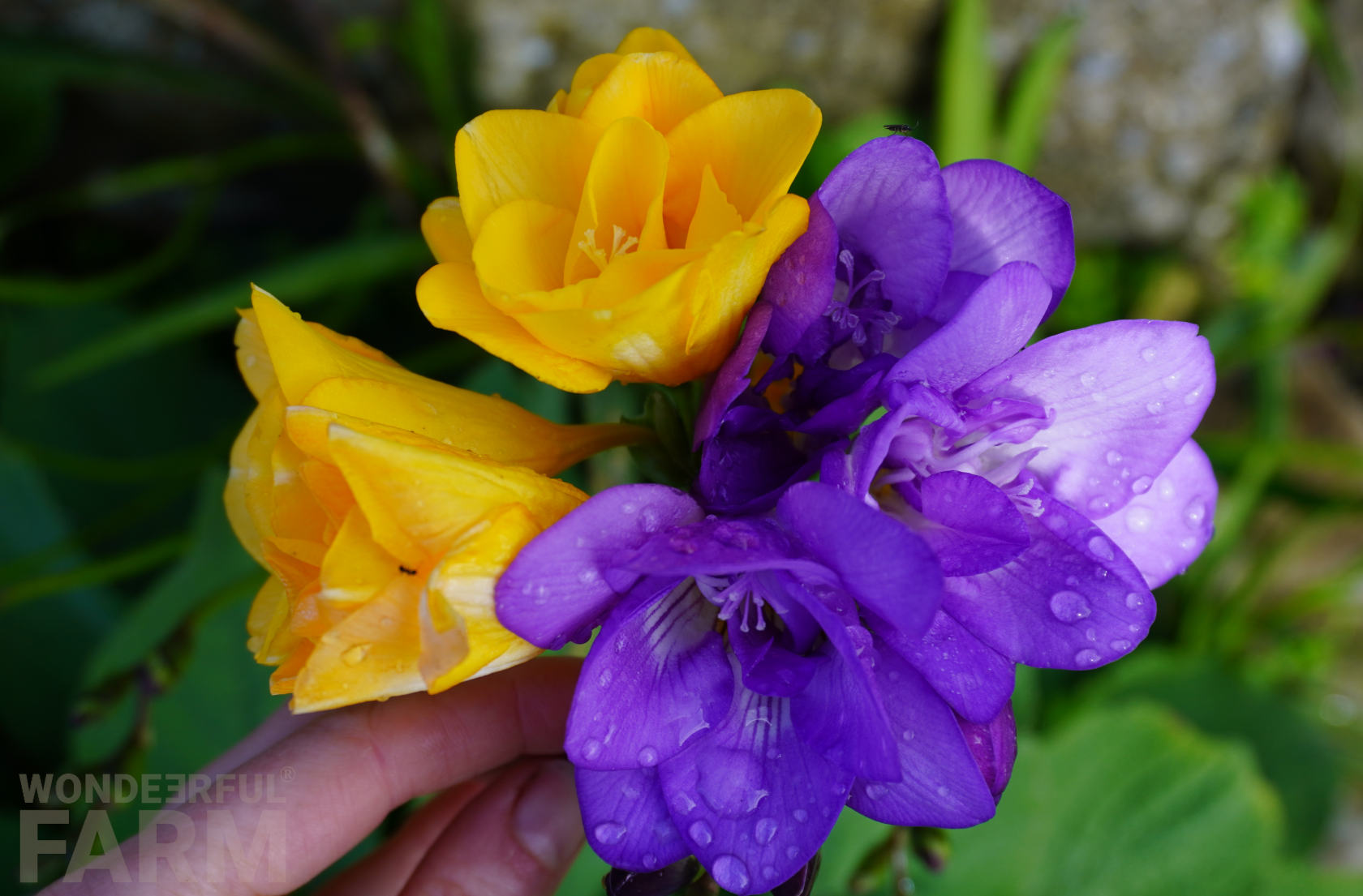Are Freesias Deer Resistant?
» Deer stories » Deer resistant plants » Are Freesias Deer Resistant?Plant type: bulbs
Deer resistant: yes
Our plant hardiness zone:
New Zealand: subtropical
U.S. Zone 10b
Freesia is a type of flowering plant that belongs to the family Iridaceae, commonly known as the iris family, a diverse group of plants which inclused not only irises but also several other beautiful and interesting species, such as gladiolus, crocus.
It is famous for its showy and fragrant flowers which come in a wide range of colors.

This was the first time we've planted a mix of freesias near our house.
The magic is not just in the views, because with these blooms suddenly a sweet, delicate fragrance fills the air. And when your garden not only looks but also smells nice - it's a doubled sensory delight!
As these flowers have tall, strong stems they're great as a cut flower.
However, despite the sturdy stems, freesias still somehow like to lean rather than stand upright. And it's not the wind, because ones in a pot growing inside are flopping over just the same. So when planting you might want to consider a support system. It's too late for us this year (nearly spring time here in New Zealand and they're fully grown and beginning to bloom) but for the next one we'll consider trying a grid like this one - 16 x 24 inch Grow Through Plant Support.
This first year we've just been using some rocks to prop up our leaning flowers a bit. Next year, being more experienced gardeners, we're planning to move the bulbs into a different spot where they'll have something to lean on and instead plant the dwarf variety in the most prominent area in the garden. We've only planted a few of dwarfs (called freesia nano) last year and they are holding up, literally UP :) much better than the 'Giant masterpiece' variety. Same magical fragrance, flowers nearly same size.
Are Freesias Safe from Deer?
So what about the deer, right? Are they a threat to beautiful freesias? The answer is no, deer do not eat freesias! They walk past them totally disinterested, THANK GOD!
But why won't deer eat freesias?
So because freesias have a distinct and strong fragrance, deer tend to dislike it. Their sensitive sense of smell might make the scent of freesias unappetizing to them because it's so much stronger than ours, and what is a subtle aroma to our nose is a ungodly stench to theirs.
While freesias are not considered highly toxic, they do contain alkaloids that could be mildly toxic if ingested in large quantities. It's possible that deer have learned to avoid plants with these compounds as a survival instinct.
Finally, because freesias belong to the Iridaceae family, which is known to possess natural deterrents that make them less attractive to herbivores. These deterrents could include compounds that cause digestive discomfort or that deer simply find unappealing.

Whatever the true reason, we can safely put another truly deer-proof plant on our list!
If your mind is now set on trying out freesias, best way is to plant some bulbs rather than seeds because you'll see the flowers already next spring.
This is how our freesia bulbs looked:

In autumn, you can search your nearest garden center, or order freesia bulbs for planting online, on Amazon, and we appreciate if you do this by following our link as we'll get a small reward at no additional cost to you! When the flower buds start to form, you may want to fertilize your plants with some bulb food.
So our advice is, look into this family of plants if you have a deer problem, to find truly deer resistant options. We sure are and we'll keep you updated on our results.
As always, good to reiterate, that factors like local deer populations, food availability and environmental conditions can influence deers' feeding behavior and even the most deer proof plant can possibly somewhere sometime get eaten. But not as likely this will be the case with freesias as with hostas or zinnias.
P.S. And if you're having slug and snail issues, like us, you may be happy to know they don't fancy freesias either. All our hyacinths have been devoured by the slimy pests, but freesias survived intact.
Last modified 01 December 2023 at 15:25
Published 28 August 2023
Add your comment
Plants alphabetically
More «Deer resistant plants» stories
Do Deer Eat Arugula
Arugula, Eruca sativa, is a leafy green vegetable with a distinctive and peppery flavor. This plant does suffer a few bites, but those are tiny holes from other garden pests, such as worms or slugs.
read more...
Do Deer Eat Calla Lily
One notable attribute of Calla lilies, especially for gardeners dealing with deer infestations, is their deer resistance.
read more...
Does Bambi Like Bamboo?
Do deer eat bamboo? We are deer farmers with bamboo on our property, so the answer to your question is that deer and bamboo ...
read more...
 '
'



Vik 01-09-2023:
It's a beautiful website! 👍